
|
 |
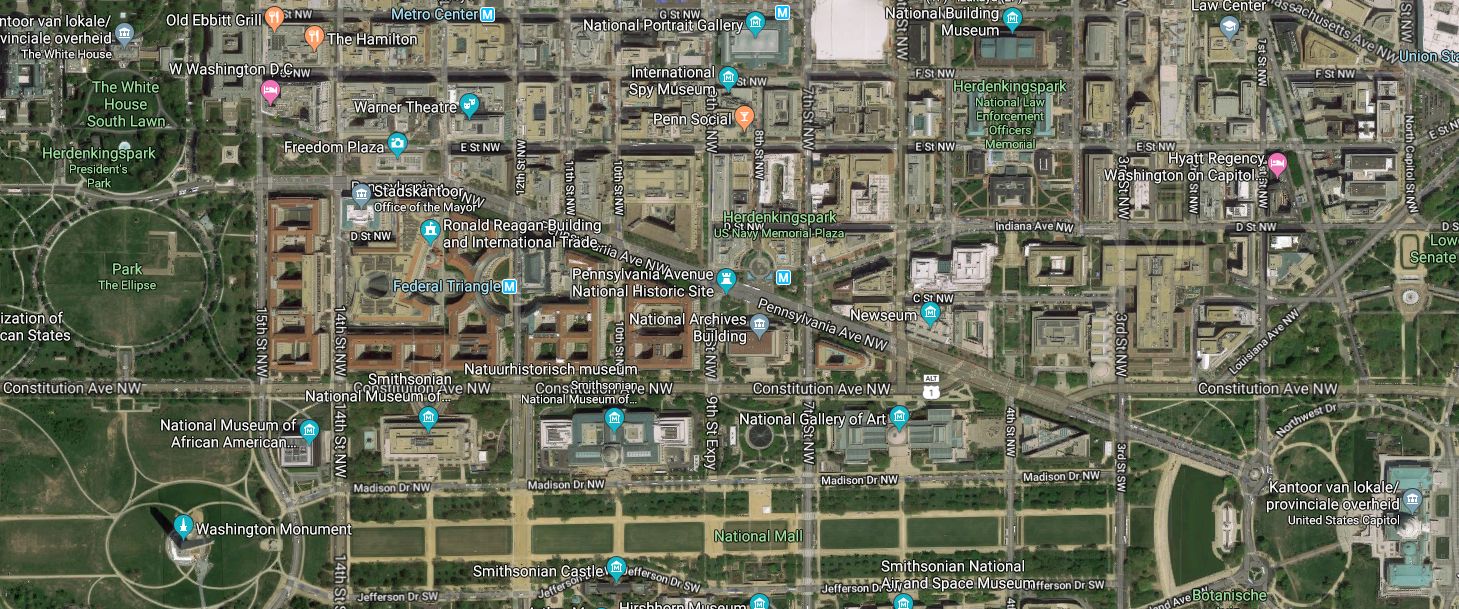 |
|
| 2018 |
 |
 |
 |
Fall 2018, Washington Ideas became The Atlantic Festival (@TheAtlanticFest | #TheAtlanticFest). The new name pays
homage to 161 years of award-winning journalism, analysis and storytelling and captures the expansive nature of this year's event. From Tuesday, October 2 – Thursday, October 4, The Festival will take over multiple blocks of Washington, DC's Penn Quarter – from Sidney Harman Hall to Hotle Monaco and beyond. The Atlantic convened thought leaders, press and industry professionals to discuss the most consequential topics facing us. With several events happening simultaneously, guests had the opportunity enjoy a multitude of topical summits, on-stage interviews, networking opportunities, exclusive screenings and gripping performances for an unparalleled experience in the heart of Washington, DC. Take a look at our event calendar for more information on each opportunity.
On the Ideas Stage at Harman there will be three days of headline interviews and can't miss conversations with big thinkers and leaders in tech, politics, business and the arts – illuminating new ideas and grappling with the most consequential issues of our time. Across our downtown campus, there were film screenings, book talks, networking receptions, breakout lunches, field trips and muchhhh more. This is our tenth year and certain to be the most eventful experience yet. Speakers include: @HillaryClinton , @LindseyGrahamSC , @ChrisChristie , @KellyannePolls , @deray , @chefjoseandres , @SenKamalaHarris , @6Gems , @aijenpoo , @JohnKerry , @SecretaryPerry , @ArlanWasHere , @EstherPerel , and many more. |
| 2017 |
| 2016 |
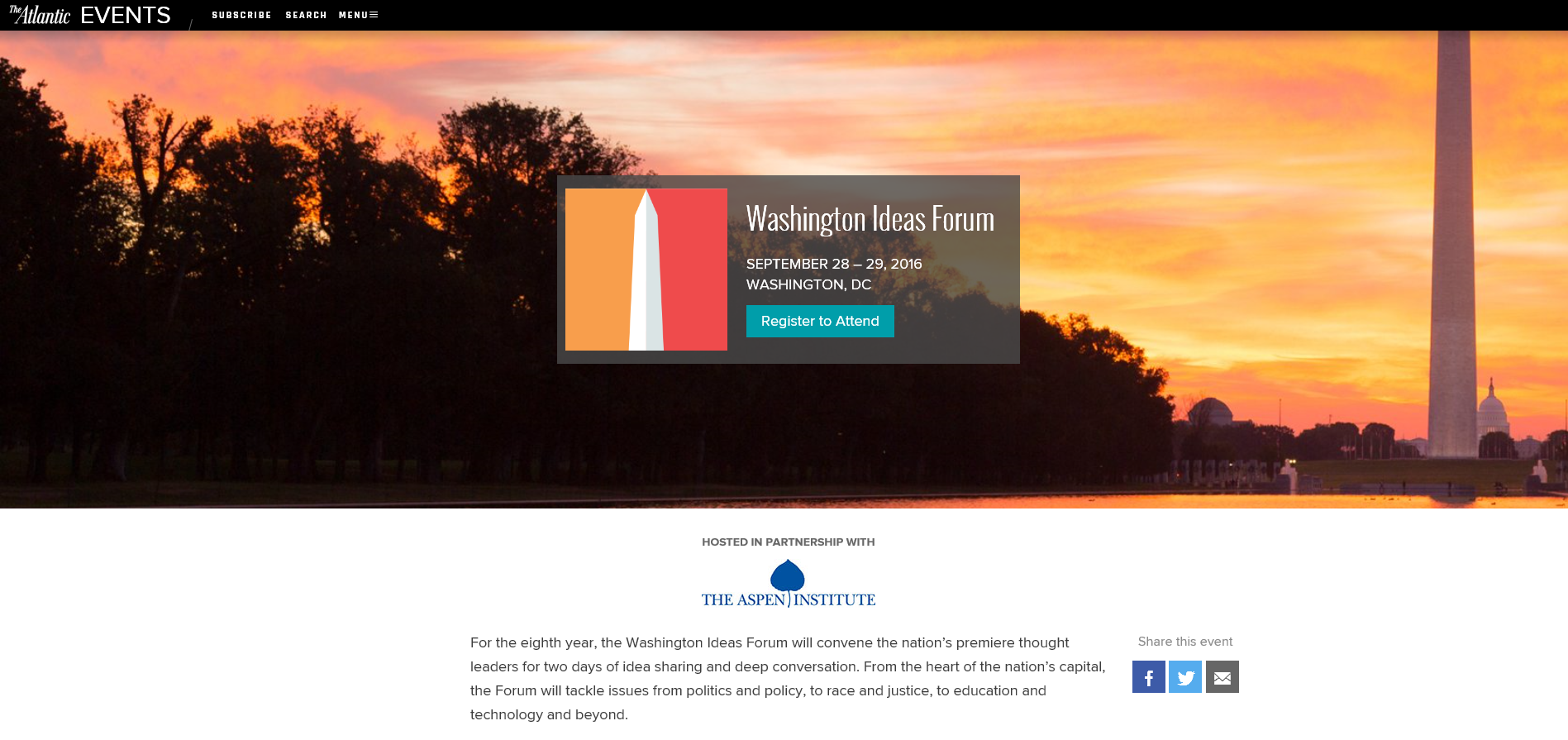 |
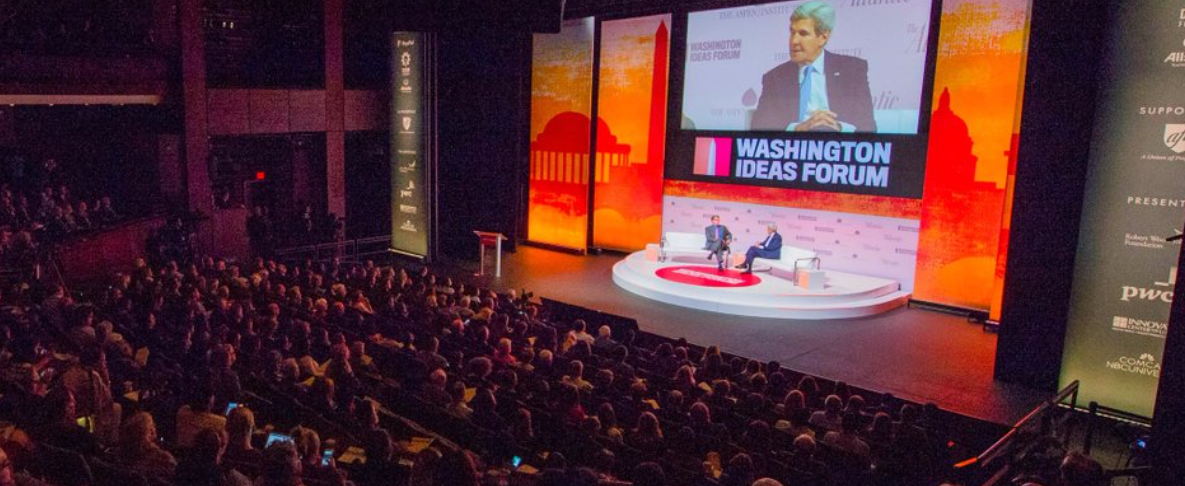 |
.png) 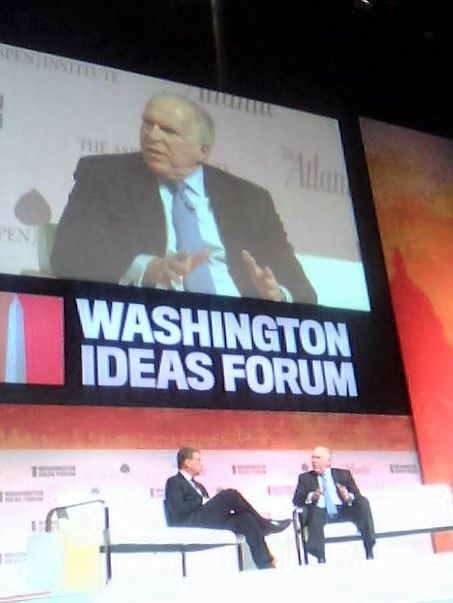 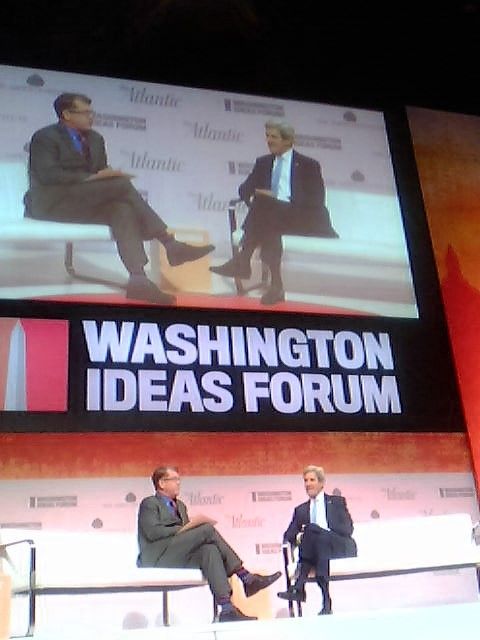
|
| 2015 |
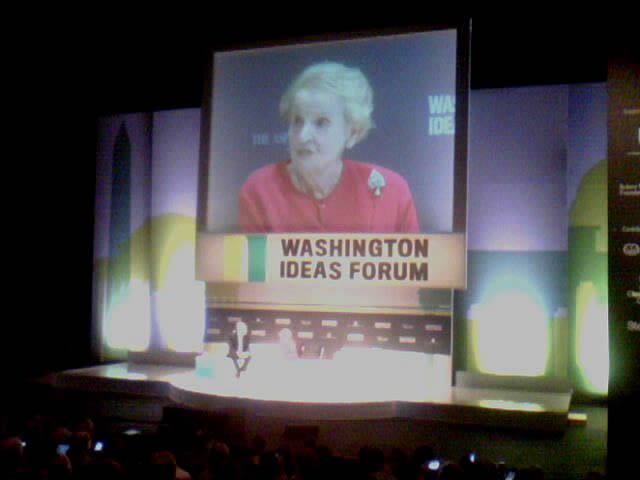 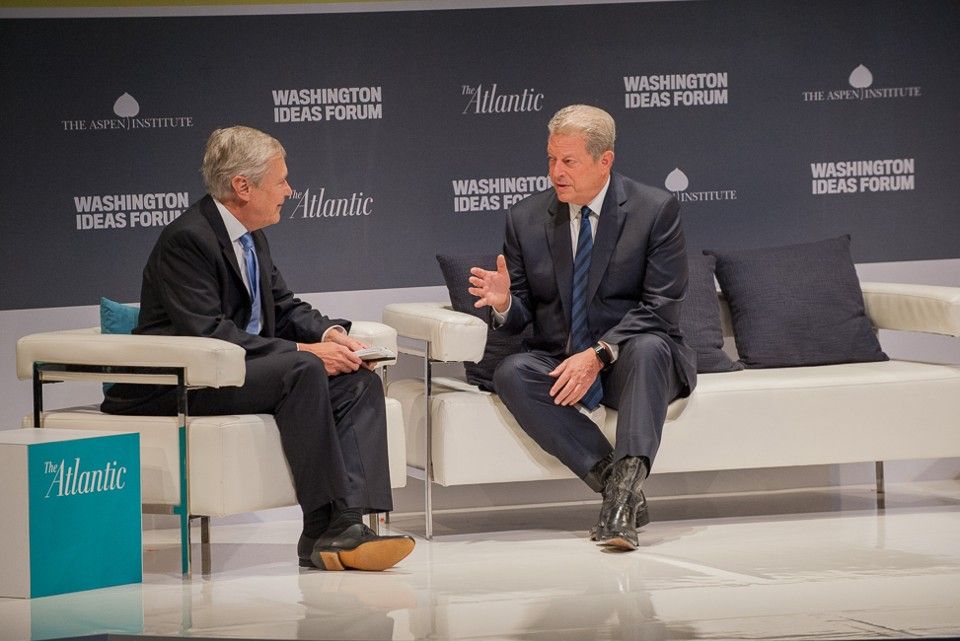 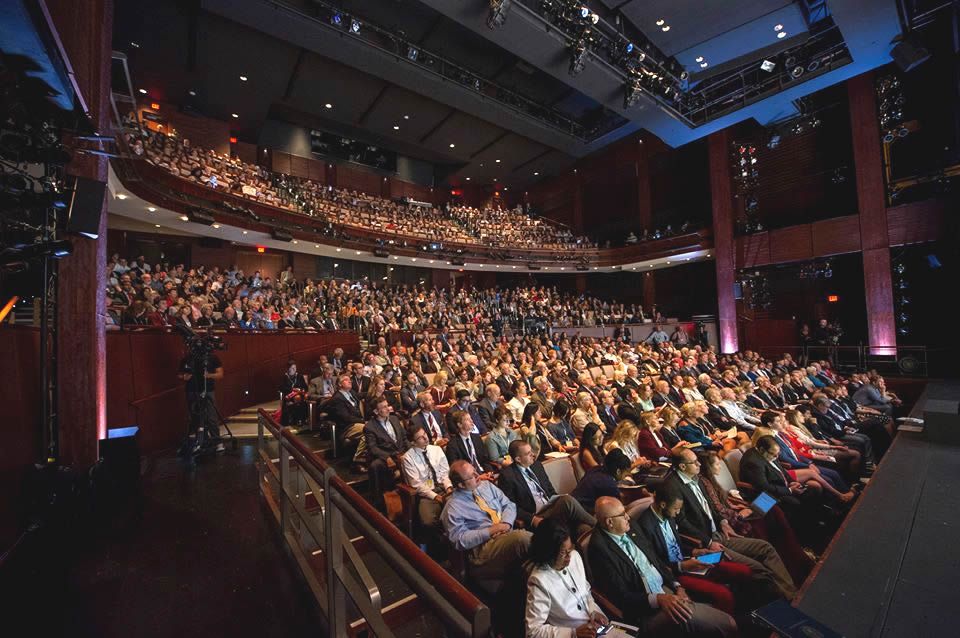 |
|
| 2014 |
|
In its sixth year and hosted in partnership with the Aspen Institute, the Washington Ideas Forum has developed a reputation for fostering creative thinking about the critical issues affecting national identity, politics an core values. WIF 2014 will cover topics ranging from energy and technology to healthcare and urban renewal.
Washington insiders including US Secretary of State John Kerry, Defense Secretary Chuck Hagel, Commerce Secretary Penny Pritzker, Attorney General Eric Holder, and National Security Advisor Susan Rice took the stage at the sixth annual Washington Ideas Forum. Also featured were author Chimamanda Ngozi Adichie, Whole Foods CEO Walter Robb, Michael Froman US Trade Representative Executive Office of the President, and financier T. Boone Pickens. Watch video from the two-day event. |
The Aspen Institute and The Atlantic brought those pushing change, offering solutions, and sparking new concepts to the District for the sixth annual "Washington Ideas Forum," October 29 and 30 at the Harman Center for the Arts. Across two days of interviews and panel conversations, entrepreneurs and business visionaries, designers, educational disruptors, leading politicians, media minds, and innovators in science and technology shared their ideas and insights into key issues impacting the world. The Washington Ideas Forum expects draw an audience of more than 1,500 people across the two days.
|
| 2013 |
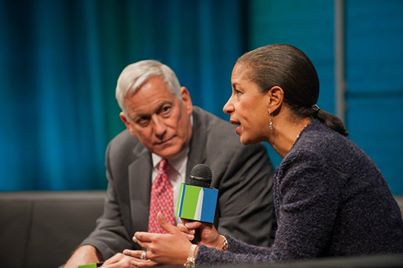 |
The Washington Ideas Forum 2013 (5th), presented by The Atlantic, the Aspen Institute, and the Newseum, is D.C.’s premier gathering of U.S. policymakers, industry innovators, and top media personalities. From 12 to 14 November, the fifth annual Forum convened newsmakers and leading journalists for debate, conversation, and idea-sharing, brought together close to 1,500 guests across the three days of distinctive social events, main stage plenary sessions, and curated breakout meetings, further cementing its distinct reputation as DC's destination for fostering creative thinking about critical issues by some of the most newsworthy figures of our day.
To watch highlights of the event and read coverage of the program's conversations, please visit TheAtlantic.com's dedicated Special Report to read more and see photos on our Facebook page. To access key findings from the Forum's breakout Working Summits on the morning of November 14, please select from one of the five topical sessions: |
| - Jumpstarting the Economy Working Summit - Engaging Students Working Summit - Prescribing Reform Working Summit - Investing in a Sustainable Future Working . Summit, - Transforming Technology Working Summit |
| 2012 |
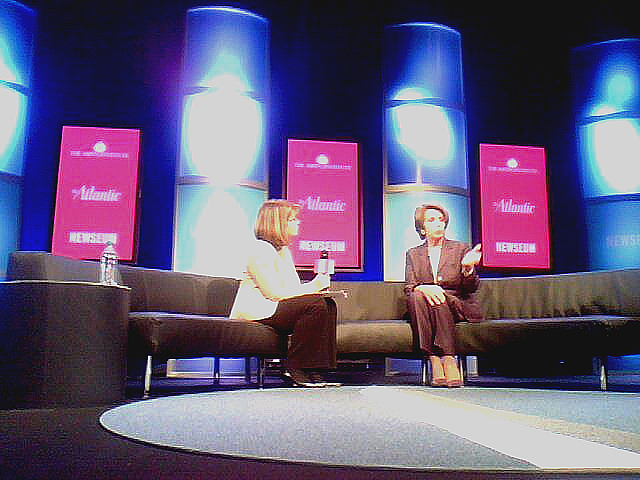 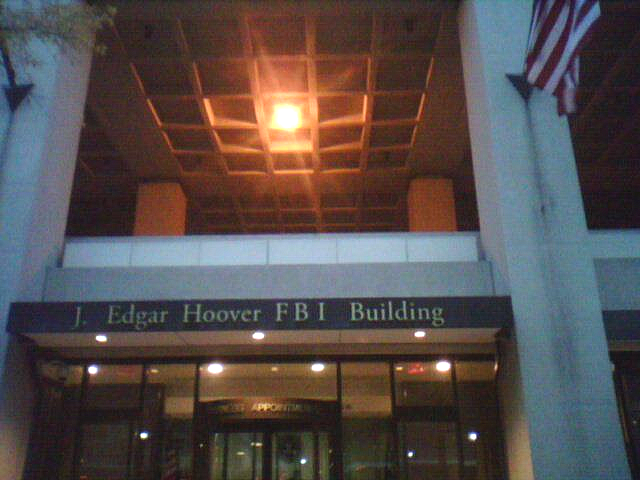
 |
The real Mitt Romney has finally stood up, according to House Minority Leader Nancy Pelosi.
Speaking at the Washington Ideas Forum 2012, she reflected on Romney's remarks on a conference call with donors Wednesday in which he attributed President Obama's reelection victory to "gifts" the president has given minorities and women voters in the form of government programs. "I would say the most sincere thing that Governor Romney said during the campaign -- there's not much competition -- the most sincere thing that he said was the 47 percent," Pelosi said. "If you saw that ... you saw passion, you saw authenticity," she continued. "That's what he really believed, and that's what he's saying now. And that's most unfortunate.
The fall of CIA Director David Petraeus does raise larger questions about the scope of the FBI's role and the relationships between the intelligence agencies. "I've covered this story 50 times," said NBC News' Chuck Todd. Powerful man meets adoring fan, and the rest is history. However, the Petraeus story could have long legs if it ends up shedding light on the tensions within intelligence community, journalists speaking at The Atlantic's Washington Ideas Forum suggested. For one thing, it's eyebrow-raising that the FBI could launch such a comprehensive investigation into the e-mail records of high level officials and private citizens "with almost no pretext," said Margaret Carlson of Bloomberg News.
|
This is in a region where we used to have some sense who was in charge. In all of the countries there are now questions." We have a "frosty relationship" with the current Israeli government. It seems U.S. leverage is at a low. What tools does the U.S. have to calm the situation? Albright: The current situation is as sticky as we've ever seen. Foreign policy is just getting other countries to do what you want, and there really aren't that many tools: multilateral diplomacy, bilateral diplomacy, sanctions, threat of force, force, and law enforcement. The situation in Gaza is very dangerous, she says. Israel has a right to defend itself, but the assassination of a Hamas chief makes it dodgier. |
| 2011 |
Inspired by The Atlantic's enduring partnership with the Aspen Ideas Festival, the third-annual Washington Ideas Forum gathered an audience of 600 people, including government officials, top business executives, global thought leaders, academics, and celebrities. It was the place to hear - and meet - the most prominent thinkers of our time.
"The Washington Ideas Forum has quickly established itself as an excellent venue for policy makers and prominent thinkers to debate and discuss serious challenges facing the country," said James Bennet, editor of The Atlantic.Just as in 2009 and 2010, the forum was presented by The Atlantic, The Aspen Institute and the Newseum and brought once again the best and brightest to the table for debate, conversation, and idea-sharing. |
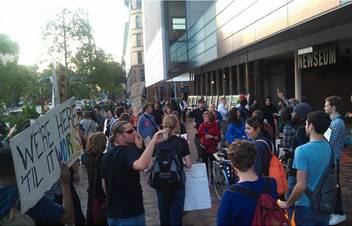 |
"Once again we joined with the Aspen Institute and the Newseum." Elizabeth Baker Keffer, president of AtlanticLIVE added, "We did assembled a stellar lineup of more than 60 speakers--business and civic leaders, plus leading journalists from every major network and top print and radio outlets. The Washington Ideas Forum was once again a destination event this fall.""It is true to the spirit of the Aspen Institute that we brought together leaders of different ideologies, industries, and backgrounds for the kind of vibrant yet civil exchange that is so sorely lacking today," said Walter Isaacson, CEO of the Aspen Institute. "I could not be more pleased that we partnered with The Atlantic and the Newseum again for this important event." |
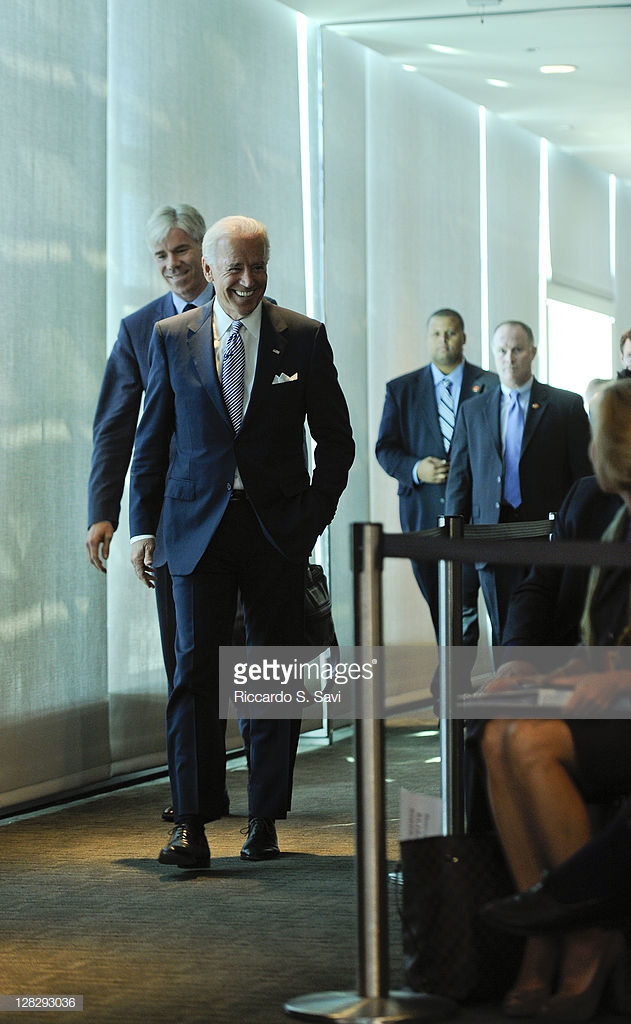 |
The editorial board for the 2011 Washington Ideas Forum comprises David Bradley, James Bennet, Shelby Coffey, Margaret Carlson, and Steve Clemons. Presenting underwriters include Allstate, Bank of America, Comcast, ExxonMobil, Thomson Reuters, UTC, and Siemens. Since 1857, The Atlantic has played a central role in shaping the national debate on current affairs and cultural trends. Dedicated to bold, independent, diverse, and highly reasoned perspectives, its writers, bloggers, and critics represent the best in American journalism. Follow the conversations day 1 and day 2 and on Twitter at www.twitter.com/AspenInstitute <- Photo by Riccardo S. Savi/WireImage |
Through a series of headline interviews, a cross-section of leaders from government, business, education, and the media engaged in a high-level, 360-degree analysis of the year that has passed and the year that lies ahead. Confirmed newsmakers joining in the discussions include:
|
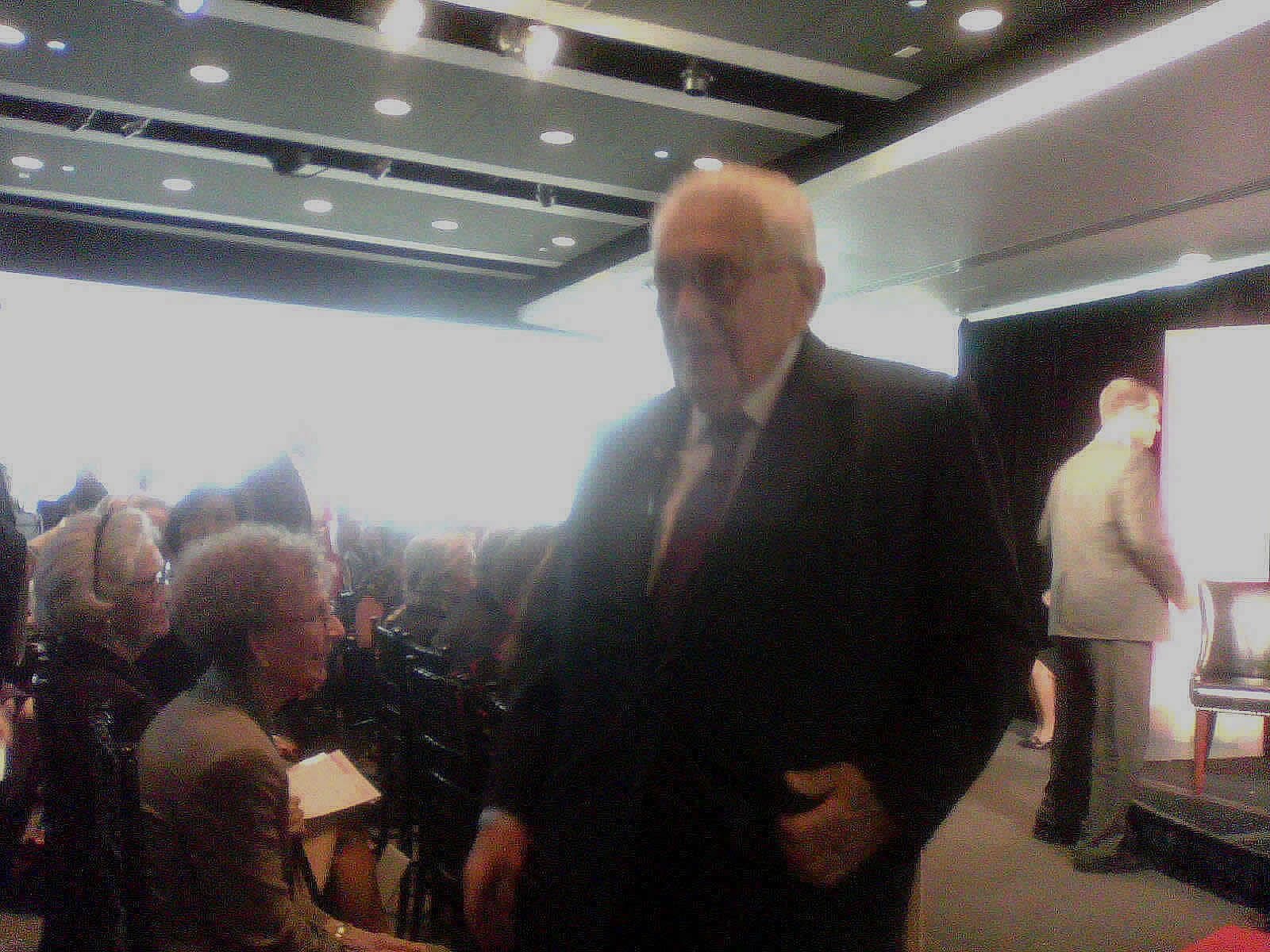 |
Vice President Joe Biden; Speaker of the House John Boehner (R-OH); NBC News President Steve Capus; former Vice President Dick Cheney and his daughter and co-author Liz Cheney; White House Chief of Staff William Daley; Treasury Secretary Timothy Geithner; film director Alex Gibney; Valerie Jarrett, senior adviser to President Barack Obama; Henry Kissinger († 29 Nov. 2023), former Secretary of State; MSNBC's Chris Matthews; Brian Moynihan, President and CEO of Bank of America; Pervez Musharraf, the former president of Pakistan; CBS News President David Rhodes; economist Alice Rivlin; Sen. Marco Rubio (R-FL); Rep. Paul Ryan (R-WI), chairman of the House Budget Committee; Supreme Court Justice Antonin Scalia; Google's Eric Schmidt; ABC News President Ben Sherwood; ExxonMobil Chairman and CEO Rex Tillerson, and Mayor Antonio Villaraigosa of Los Angeles. Participating journalists include: MSNBC's Maria Bartiromo, The Atlantic's James Bennet, NBC News' Tom Brokaw, The New York Times' David Brooks, Atlantic Media Company's Ronald Brownstein, The Atlantic's Steve Clemons, National Journal's Charlie Cook, ABC News' Katie Couric, The Atlantic's James Fallows, The Atlantic's Jeffrey Goldberg, NBC News' David Gregory, PBS NewsHour's Gwen Ifill, CBS News' Norah O'Donnell, American Public Media's Kai Ryssdal, NBC News' Chuck Todd, FOX News' Chris Wallace, NBC News' Brian Williams, and Fox News' Juan Williams. |
 |
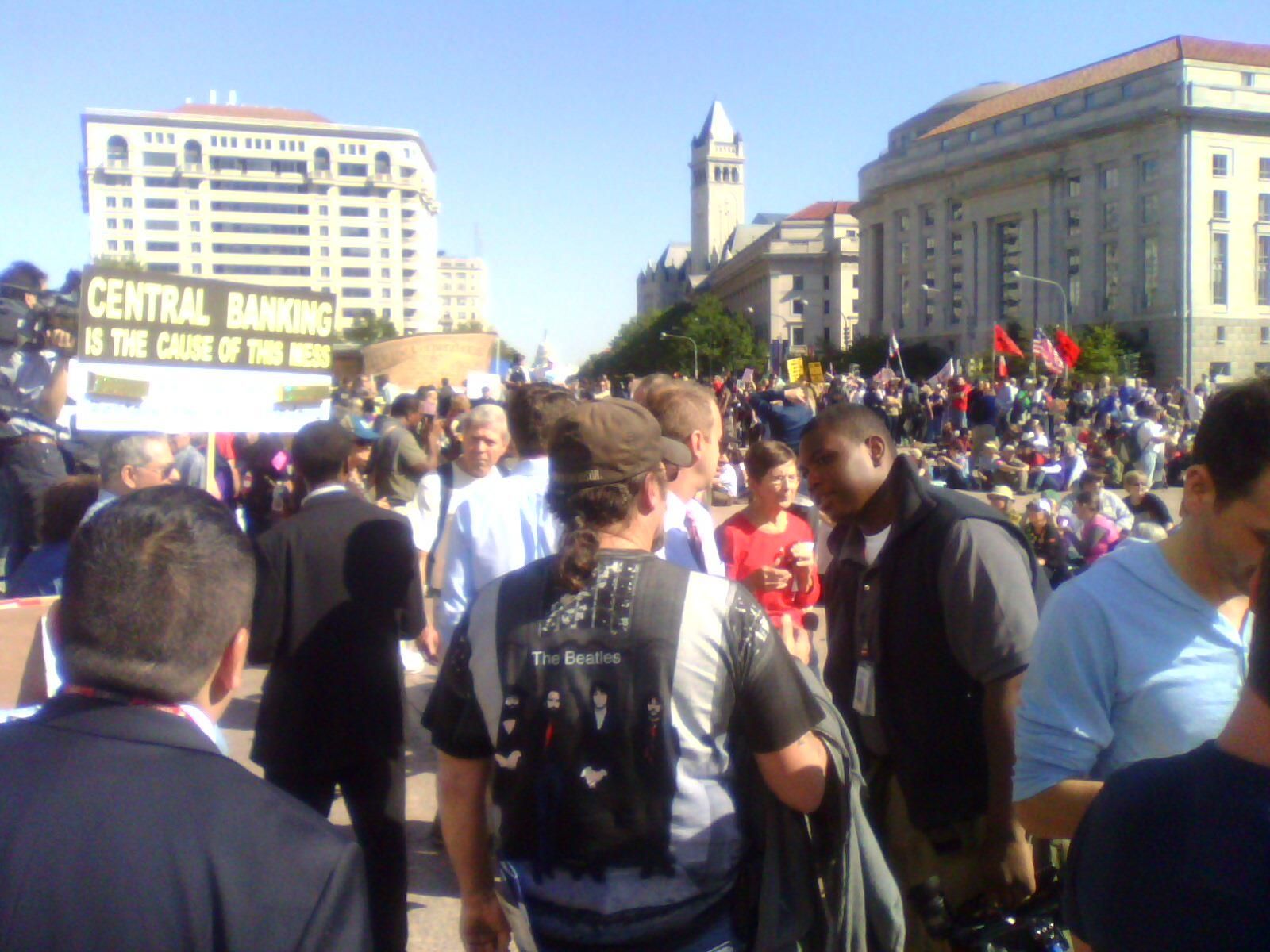 |
 |
| People are pretty nervous about the future. The "Occupy"-movement ('99%', i.e. the have not's) brought some commotion outside the building, because there were plans to provide access to go to the conversations.
The Washington Ideas Forum (WIF) is a special event, initiated in 2009 by the Aspen Institute, The Atlantic and Newseum. The first gathering started successful and it was decided to schedule it annually. The uniqueness of the meeting is that it concerned speakers of caliber, (former) rulers or consultants, who all provide current information and knowledge (sometimes with news-making effects). Of the 28 sessions / speakers, more detail for a few is given (speakers who's name only provide dynamics, or speakers who reported on surprising statements or on matters concerning Europe). The WIF-catalog stated that:
|
 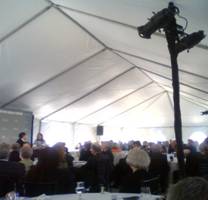 |
On Wednesday I walked to the Newseum, the location where the meeting was organized situated about 1 kilometer from the Capitol.
The kick off was 11:45 am, consisting of a lunch together with 3 sessions from 12:00 pm to 13:00 pm in "The Knight Convention Center, 8th Floor Terrace. During these sessions was put forward the development of the Arab uprising (and the role of social media), the present situation in Syria that can last no longer than between six months and a year, because no one in the region will tolerate 30 deaths.per day, concerns about the relationship Saudi_US because of an important difference of opinion about what happens in the Arab uprising, theprudence of the Saudi royal family and the fact that not democratic Arab governments will have to reform in order to survive, a talk on energy efficiency and on health(y food). |
John Boehner accused Obama he's campaigning for the 2012 elections to be rather than to rule. (Obama considers himself the underdog. After so much excitement and expectations. What went wrong? Experience? There is some disappointment in him to be seen). Boehner also wants to see more and faster change. The government should go into action. People do not see any answers they expect.
He stated that China manipulates the economy and that the U.S. has to continue the debate with China: in spite of different views on policies, a certain common basis can be achieved.
On terrorism has reached more than under the Bush administration. One challenge is even eliminate Taliban and AQ. And concludes with "our openness and diversity, our freedom and opportunities to". |
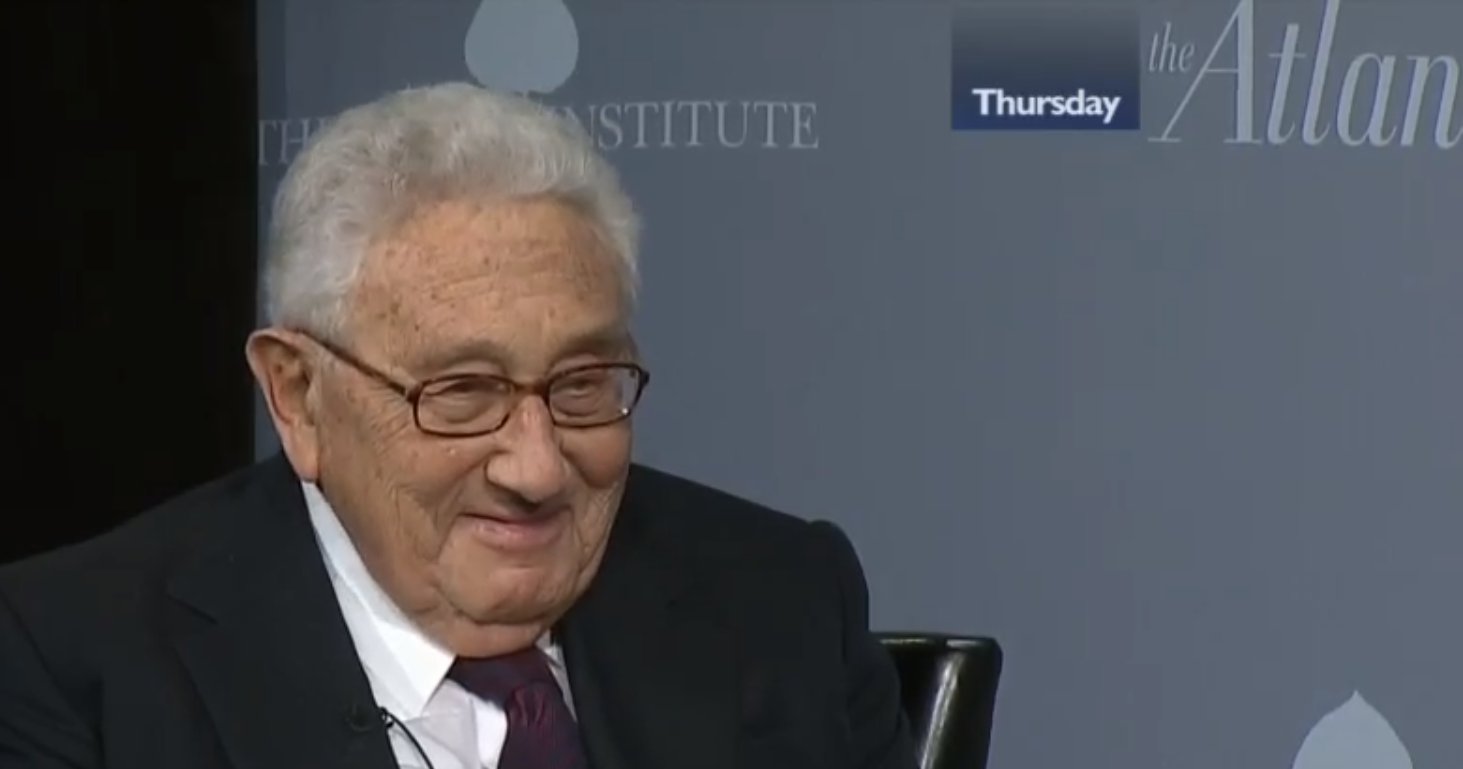
|
Henry Kissinger († 29 Nov. 2023) thinks that the point for the U.S. where "its people can be leaders by doing any one dramatic thing" is over and added that it is not easy to admit that there exists strategic restrictions, referring to Iraq and Afghanistan.He spoke about China and the possibility of cooperation by realizing challenges that concern both countries. However, he is not optimistic about this.
Pervez Musharraf stated not to have been aware of the presence of O bin Laden in Pakistan. He also said that some kind of (legitimate) conflict is working, which is creating a conflict between India and Pakistan (India trains Afghan soldiers and tries to get Afghanistan among his sphere of influence). |
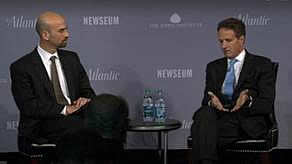 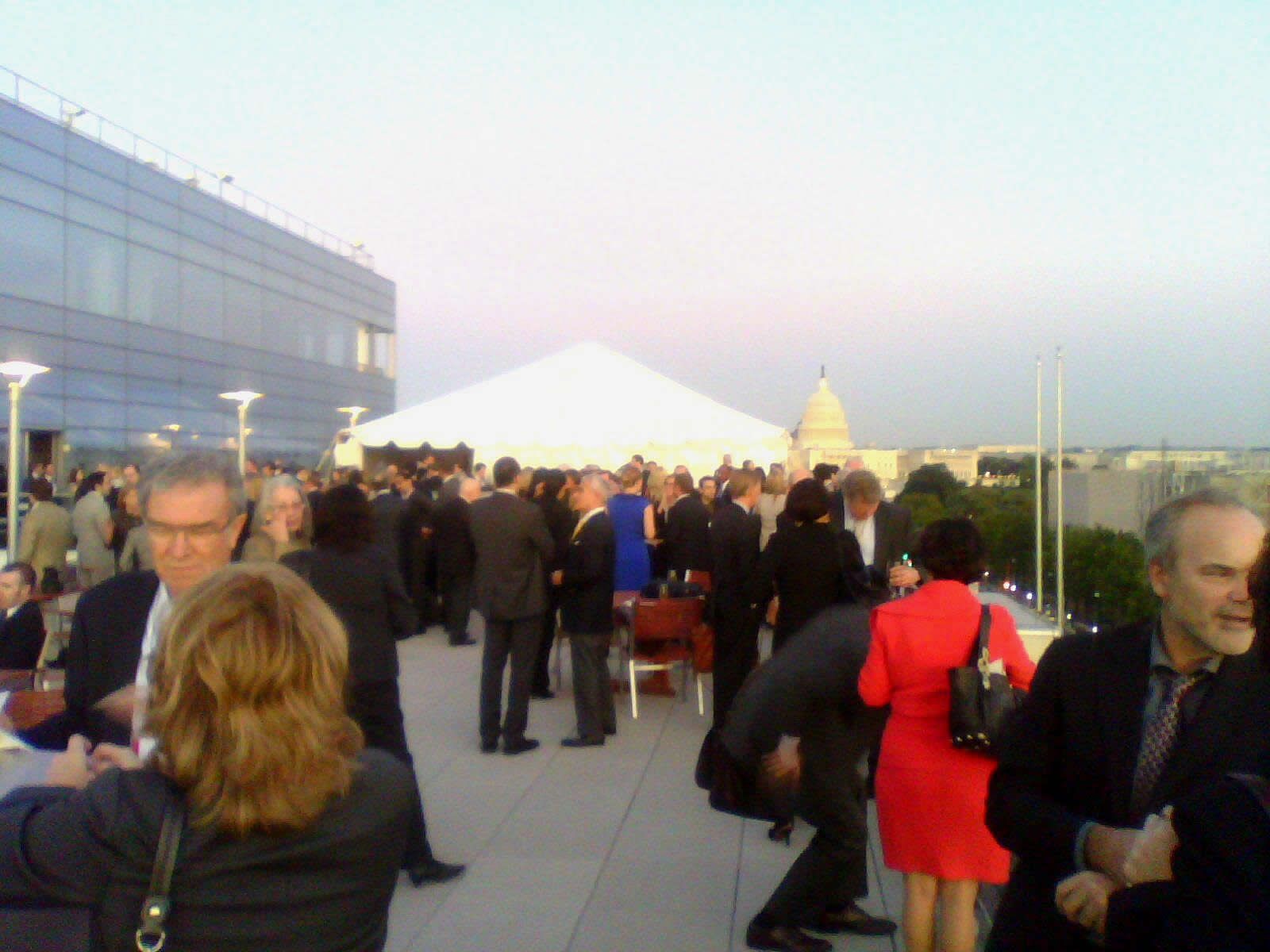 |
Timothy Geithner, who said that if Congress does not act on the employment package, growth in the U.S. will weaken and will become more vulnerable to outside influences, such as for example a European recession.
He stressed unease regarding the slow responses to the major debt crisis. Much more have to be done. Continent-wide, there are financial resources in relation to the current crisis. It is a serious situation in Europe. The euro must be stabilized with a package. There is a huge damage and Europe means a lot to us. We have beliefs and Europe welcomes this. Germany and we want eliminate and let increase that (eg by pressure on the private sector). There is still a chance for Euro. Next up was the Bill Daley, the White House Chief of Staff. You would be hard pressed to find a more witty and charismatic person in the Newseum that afternoon. Daley answered questions on Obama, the economy and the upcoming election while simultaneously receiving extended bouts of laughter from the press room. Daley riffed about his predecessor, Rahm Emanuel, and when questions about which Republican he was most worried about Obama running against, he answered “Christie!” with a big smile on his face. When asked who won the golf match that included Obama and former president Bill Clinton, Daley joked that “you don’t keep score when you play golf with Bill Clinton.” But don’t get the wrong impression, it wasn’t a full on comedic effort by Daley. He emphasized bi-partisanship when it came to Obama’s struggling jobs package. He insisted that if the bill was truly dead on arrival, then its opponents must be productive and propose a legitimate alternative to help the faltering economy. |
FRACTURED GOP is the PROBLEM
Vice President Joe Biden said the administration will take its jobs bill directly to the American people to put pressure on Republican members of Congress to pass it. Despite the conventional wisdom that the bill is dead on arrival, Biden said, "What happens that gets it passed is we have to go to the people. That's what the president says and it's been my point of view for a while now. We should go to the people and we should be asking every one of those congresspersons, 'What are you against?'" Interviewed by David Gregory at Thursday's Washington Ideas Forum, Biden said the main obstacle to moving the economy forward is a fractured Republican Party that its congressional leadership is unable to control. "I think [President Obama] does have a partner in the bulk of the leadership but they are seriously hamstsrung," Biden said. During the debt-ceiling negotiations, he said, "we had a much bigger proposal I was personally negotiating with them as to how to deal with the debt crisis and they could not sell it." Biden said House Majority Leader Eric Cantor would deny this account because he was obligated to. "This is just Joe Biden's impression, but I truly believe if just Eric Cantor, Joe Biden, Barack Obama and John Boehner were allowed to settle the deal in the room we would have had a deal." But the GOP has changed, he said. "My view is that their party is not the Republican Party that we all know. In my view, we need a strong Republican Party. We need a Republican Party that's united." Thus, he said, "Part of what this is about is going over the heads of the Congress to the people, to their constituents, and make the case." Biden likened the Occupy Wall Street protest to the tea party, saying both stemmed from the sentiment that corporations were being favored over the middle class. "What is the core of that protest and why is it increasing? The core is that the bargain has been breached with the American people. The core is that the American people do not think the system is fair or on the level," Biden said. The tea party began protesting government bailouts for the same reason, he said. Look, guys, the bargain is not on the level any more in the minds of the American people. The middle class is getting screwed." Biden harshly criticized Bank of America's move to charge debit-card users a $5 monthly fee, saying it wasn't justified after the middle class bailed banks out with their tax dollars. "At a minimum, they are incredibly tone deaf," Biden said. "And at a maximum, they are not paying their fair share of the bargain here, and middle-class people are getting killed." |
|
The bank argues that it is only responding to new government regulations, Gregory said. Biden likened that to a teenager, forbidden to drive his parents' car, who responds, "OK, so now I've got to steal a car. I've got to get around somehow!"
Obama's declining approval ratings are a function of people's economic anxiety, Biden said. "If you look at all the polls ... a clear majority of the American people blame their financial straits on the last administration. They understand what got us in this trouble," he said. "So they get it. But we're in charge, so they're looking to us to fix it, and they're frustrated and I don't blame them." Despite all this, Biden predicted that the Obama-Biden ticket will prevail in next year's election. "I think we win," he said. Concerning foreign policy, Biden expects a considerable collapse of the Chinese stock market because the large oversupply of vacant apartments in China (30 to 50 million), caused by the money that is printed to look after themselves and caring local levels is gone and expects a default managed for Greece and a safety net built to banks and countries, and where all requirements for 100% guaranteed by a European entity. Richard Cheney (with Paul Wolfowitz at the first row), who approved the use of drones and disapproved the killing of a U.S. resident (Awlaki) without prosecution. His concern is the economy: "solve the debt problem". The discussions during the two days were very worthwhile, promising and educational. Moreover, there was sufficient opportunity to make meaningful contacts. A major advantage of attending the forum is that it provides incentives critical thinking about beliefs (that can possible prevent prejudices). It was information overload. Over 12 hours worth of panel discussions covered a wide array of topics: media, politics, finance, Google, news, Democrats, Republicans, the economy, jobs, immigration, social media, Obama, and more. Sound overwhelming? In a way, it was. But it was also one of the most informative and enlightening events that I’ve ever attended. As the Aspen Institute and The Atlantic write: 'insist on dialogue that is focused on the citizen, and that is suggestive and illuminating. Although we do not all can agree with each other on how to solve the problems, we can may be even learn from each other and find common ground. http://www.c-spanvideo.org/program/IdeasForum delivers streams on the interviewed speakers. |
| 2010 |
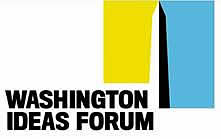 |
On 30 September and 1 October 2010 The Aspen Institute, The Atlantic and the Newseum hosted the second annual Washington Ideas Forum. The Forum featured conversations between top newsmakers and journalists. "CEO Conversation" interview sessions and "Headliner Interviews" Program.
This was an opportunity for influential Americans to hear important thinkers and policymakers as they are interviewed by American’s leading journalists. It was a unique celebration of thought and dialogue,” said David Bradley, chairman of Atlantic Media. See the special report news on the website of the Atlantic, special-report Washington Ideas Forum 2010. |
Newsmakers
Haley Barbour, Governor, State of Mississippi Bob Bennett, Hogan & Hartson, Michael Bloomberg, Mayor, City of New York, NYBill Bratton, Former Chief of Police, Los Angeles Police Department, Ahmed Chalabi, President, The Governing Council of Iraq Arne Duncan, Secretary, United States Department of Education Elizabeth Edwards, Rahm Emanuel, White House Chief of Staff Ken Feinberg, Administrator, BP Claims FundChristopher Hitchens, Author, Richard Holbrooke, United States Special Envoy for Afghanistan and Pakistan, Parag Khanna, Senior Research Fellow and Director, Global Governance Initiative, New America Foundation Sike Lee,Director Craig Newmark, Founder, Craigslist.com Theodore Olson, 42nd Solicitor, General United States Department of Justice Heather Podesta Tony Podest, Founder, The Podesta Group David Rubenstein, Co-Founder and Managing Director, The Carlyle Group, Eric Schmidt, Chief Executive Officer, Google, N.N. Taleb, Author, The Black Swan.
Journalists
AMERICANS HAVE TO MAKE SOME CHANGES, ALSO IN THEIR LIFESTYLE, THEY HAVE TO DO BUSINESS INVESTMENTS IN TIMES THAT THEY ARE DEEPLY CONCERNED. OTHERWISE, THEY WILL BE PASSED in 2025 BY EMERGING MARKETS. |
 |
 |
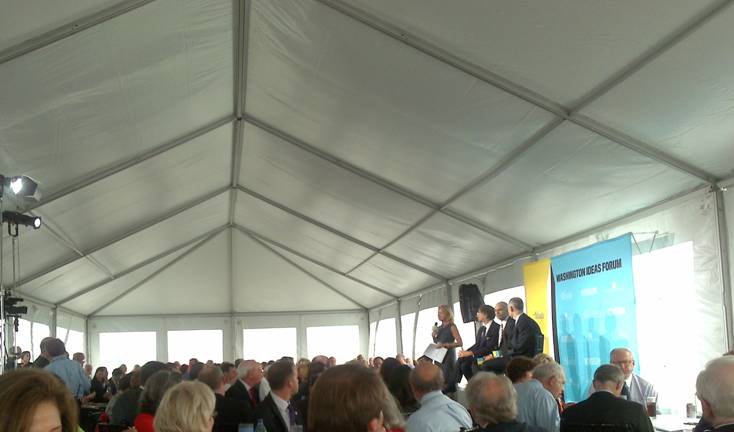 |
In 2009, The Atlantic, in partnership with the Aspen Institute and the Newseum, introduced the inaugural Washington Ideas Forum. During two days of programming, renowned journalists in key sectors drew out a "First Draft of History" from firsthand accounts of, and personal reflections upon, the events of the historic first year of the Obama administration delivered by a cross-section of leaders in government, business, and education. |
|
Four events (ranging in size from intimate editorial breakfast briefings to a large-scale reception in the Newseum’s Great Hall) and 24 program sessions brought more than 500 individuals together, including members of Congress, University presidents, nonprofit executives, renowned authors, prominent members of the media, and business leaders from virtually every major industry.
This year, an impressive list of speakers and panelists has already lined up to take part in Washington Ideas Forum 2010. The event joins business and thought leaders from around the country and across international borders, with policy makers in Washington, D.C. for a 360° view of the past year's events and in depth look at what lies in the year ahead. For those unable to attend, the event programming and content, including livestream video of all mainstage events, is covered on The Atlantic.com. |
At the Washington Ideas Forum, Holbrooke said that "success in Afghanistan is not achievable unless Pakistan is not part of the problem. In the end, we're going to work with the Pakistanis as long as I'm involved in this. That's the right policy, and this administration believes that".
He disputed Christiane Amanpour's question about why Pakistan had retaliated against an allegedly accidental border crossing by cutting off NATO military supply routes. He said that supply routes that been "slowed" but not completely closed. Holbrooke wouldn't say what "winning the war" means. "I'm not in light at the end of the tunnel stuff," he said. But over the past year, he said, "the Taliban is under immensely greater pressure, and they are feeling that." He expressed strong support for President Hamid Karzai's Taliban "reintegration" program -- but recognized that it was "not operational" because "it is constrained by the circumstances of this tragic, complicated program." And did not object to Karzai's new efforts to negotiate -- although he does not like that word -- with hard-line Taliban group. |
|
Amanpour wanted to know if the U.S. and NATO forces could get the job done by July 2011, when troops will begin to return home. "The president has not put a fixed deadline. He has said very clearly that withdrawals will be based on a careful and conditioned basis. It's the beginning of a drawdown process. There is no end-state stared."President Obama, Secretary Clinton have all said repeatedly that there has to be a presence in Afghanistan after the combat troops have left. And they will, because [combat troops] are not going to be there indefinitely."
Amanpour bristled when Holbrooke suggested that changing the ancient tribal and religious culture in the region is not a viable goal. Holbrooke bristled at the suggestion that he was condoning crimes against women. He said his point was that "[w]e will never have a day when we will be violence free." One other question Holbrooke would not touch: when the U.S. had decided that destroying the Haqqani network in Pakistan was a prime strategic goal. Holbrooke: "I'm not going to get into that." Amanpour: "That's a direct question." Holbrooke: "That's a direct answer." Amanpour: "That's a direct non-answer." Holbrooke: "You can get on a table if you want." |
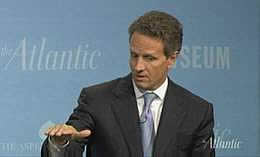 |
GEITHNER: A GOP CONGRESS CAN SUPPORT OBAMA'S POLICIES
Treasury Secretary Timothy Geithner, speaking at the Washington Ideas Forum in Washington, D.C., argued that a heavily Republican Congress should be able to support the Obama administration's proposals for improving the economy. "We believe there is an overwhelmingly strong economic case, and very broad base political support," for the measures, which include research and development tax credits, infrastructure spending, and a plan to extend all of the Bush tax cuts except those for the wealthiest earners. When asked by New York Times columnist David Leonhardt about the projected Republican wave in the midterms, Geithner said: |
"There is no reason why that package of economic reforms can't be enacted by this Congress given the challenges we face."
Geithner challenged Republicans to govern responsibly by working with the administration."We're proposing things that are very good for growth, and should be feasible, politically, for a Republican Congress that I think is now going to face the challenge of feeling more responsible for the country's future."
While he did not criticize Republicans, Geithner called on them to take greater responsibility. "These are things we need Congress to act on, and for Congress to act we need Republicans who can work with us," he said. "We're gonna have to hold them to that." |
| Washington Ideas Forum brings insiders, luminaries and media together,
October 5, 2010 George Mocharko, Staff Writer, The Stylus Friday, October 1, 2010 Washington D.C.— The 2010 Washington Ideas Forum, which took place September 30 to October 1, brought together high level government figures, businesspeople, and the news media for a salon-styled event. The event, presented by The Atlantic in partnership with the Aspen Institute took place at the Knight Conference Center at Washington, D.C.’s Newseum. It was a veritable who’s who of those shaping the policy debates of today. The two-day seminar included key Obama administration officials such as U.S. Treasury Secretary Timothy Geithner, Secretary of Education Arne Duncan, Senior Advisor to the President David Axelrod and Domestic Policy Advisor to the President Melody Barnes. White House Chief of Staff Rahm Emmanuel, who was originally scheduled to be in attendance, was noticeably absent as the announcement of his departure was just breaking. Political and business figures presenting included Senators Lindsay Graham and Jim Webb, New York Mayor Michael Bloomberg and Mississippi Governor Haley Barbour, plus David Rubenstein, co-founder of private equity firm The Carlyle Group, economist N.N. Taleb, attorneys Kenneth Feinberg and Bob Bennett, tech-guru Craig Newmark, and lobbyists Tony and Heather Podesta. The event followed a Q & A format with the questions posed by prominent news media attending and the conversations and interview offered insight into today’s important policy topics. International and national security issues were also on the table for much of the event. New York Times reporter David Rohde recounted his kidnapping by the Taliban in harrowing detail. AfPak Envoy Richard Holbrooke spoke to Christiane Amanpour about developments in the region. Dr. Ahmed Chalabi, leader of the Iraqi National Congress spoke about the religious influence on Iraqi society stating “The sectarian divide in Iraq is not about theology; it is about power and about power structure.” Former Director of National Intelligence Mike McConnell, spoke on the emerging issues in cyber security. “The economy of the United State last year was 14 Trillion dollars,” warned McConnell. “There are 2 banks in New York City that move 7 trillion dollars a day. What backs up that money? There’s no gold. There’s no printed dollars.” There were plenty of candid moments at the Forum as well. When New York City Mayor Michael Bloomberg was asked by Chris Wallace of Fox News Sunday whether he would run for president, he responded much like Calvin Coolidge would, with two words: “Can’t win.” Google CEO Eric Schmidt, who took the stage less than an hour after Tony and Heather Podesta spoke, reminded the crowd of the information divide outside the beltway by claiming “the American public doesn’t realize how many of the laws are written by lobbyists.” Director Spike Lee, who directed a new film about Hurricane Katrina called, “If God Is Willing and da Creek Don’t Rise,” claimed that Homeland Security Secretary Michael Chertoff was irresponsible in his duties with Michael Brown of FEMA as the fall guy. “People are dead now because he didn’t do his job,” said Lee. Brian Williams, anchor of NBC News, grilled David Axelrod about the government’s sluggish response to the BP Oil spill and in particular leveled a charge against the President. “Out there there in the country there are people who saw ‘hope’ on the website and clicked on it. And heard ‘change’ and voted for it, and today want to know what happened to that…” Williams continued, “The perception is, and this is not breaking news to you, that you’ve gone Washington.” “The going Washington suggestion implies that you are doing things to perpetuate yourself in power,” said Axelrod, who is leaving the administration next Spring. “If we were focused on our own interests, we wouldn’t have done any of the things that we did,” referring to the administration’s tough stands it took on Wall Street and health care reform. Yet in the post 9/11 world, “A lot of people are waiting for Barack Obama’s bull horn moment,” said Williams. If The Washington Ideas Forum continues creating great dialogue and debate like this, it will certainly give other events of its caliber a run for its money—perhaps even trumping its predecessor, the Aspen Ideas Fest. |
| 2009 |
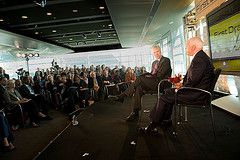  |
A new initiative. Inauguration of a 2-days forum where leading journalists, newsmakers, historians, politicians and people in the militairy field were present to talk, to discuss and to write the first draft of the history of our time.
WHY, WHAT, BY WHOM and WHERE? The Aspen Institute, in cooperation with The Atlantic and the Newseum, gathered in October 2009 leaders in Washington DC. Goals were contributions to remedies in the present transitional period in our world, concerning themes Economy & Business, eergy & Environment, Security & Foreign Affairs, Health Care, Education, Science & Technology, Infrastructure and Mobility. |
Participation is on invitation. Featured participants were White House Senior advisor David Axelrod on politics and policy in the Obama Administration, former FED chairman Alan Greenspan about the causes and remedies for the recession, David Petraeus, talking with Brian Williams about Iraq and Afghanistan, John Mc Cain, Timothy Geithner, Janet Napolitano, Congressman, senators, Michael Bloomberg, mayor of New York, Lawrence Summers and many others. |
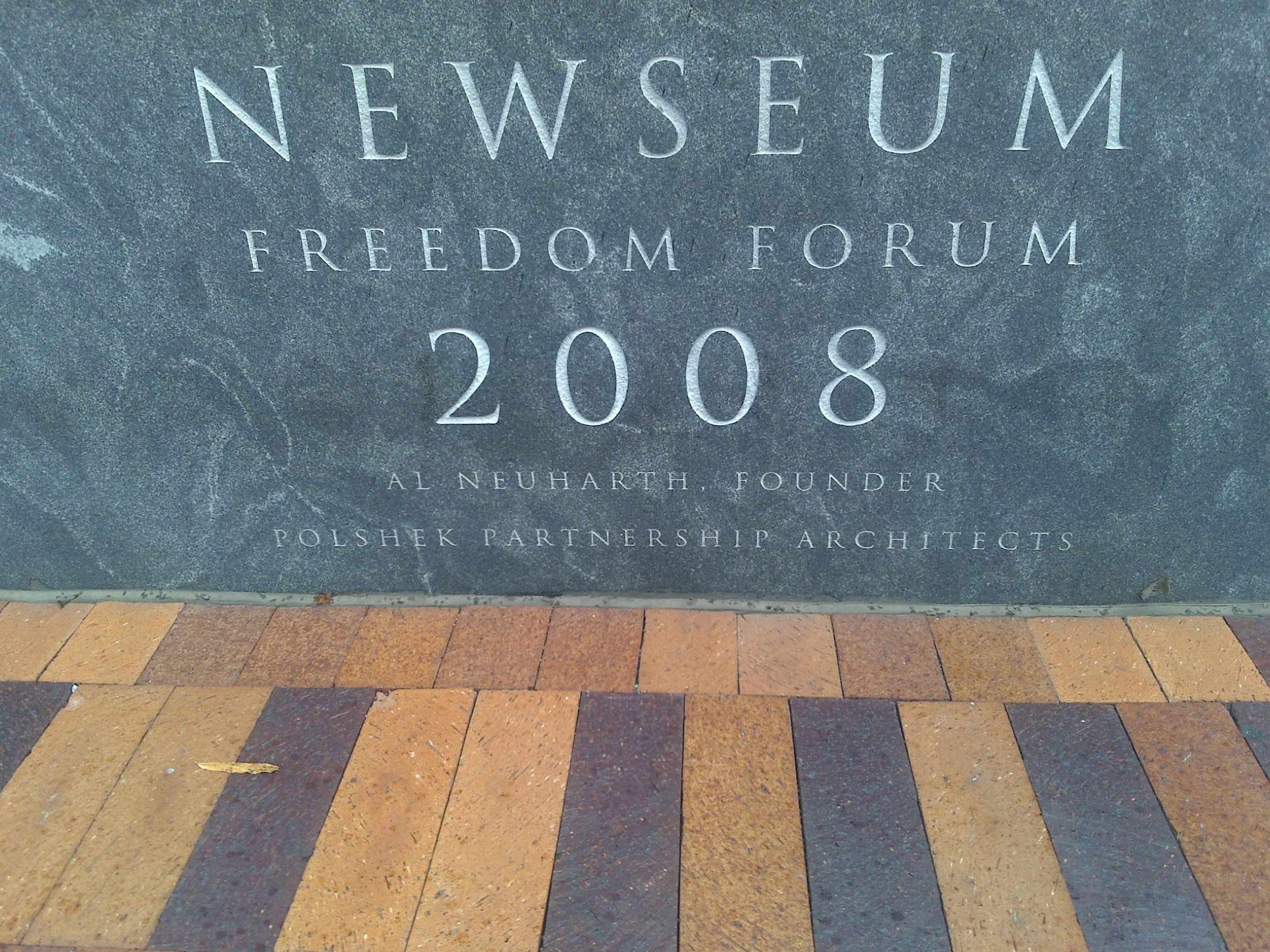 |
|
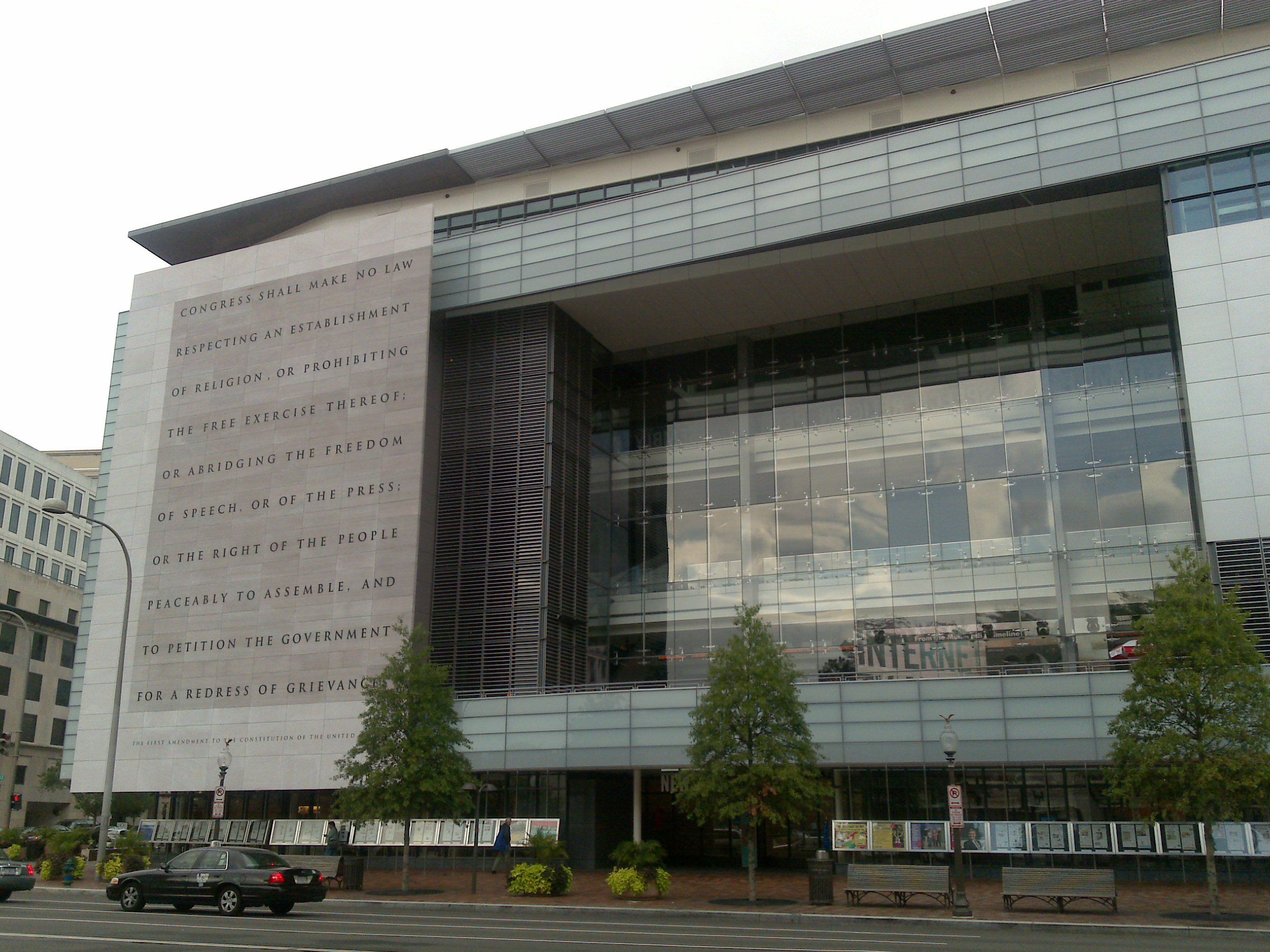 |
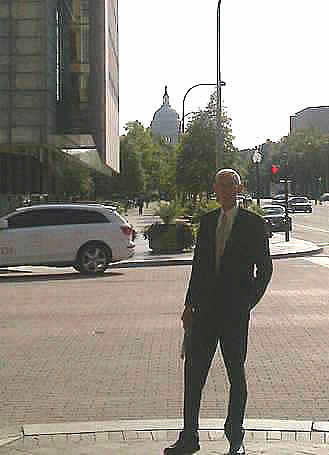 |
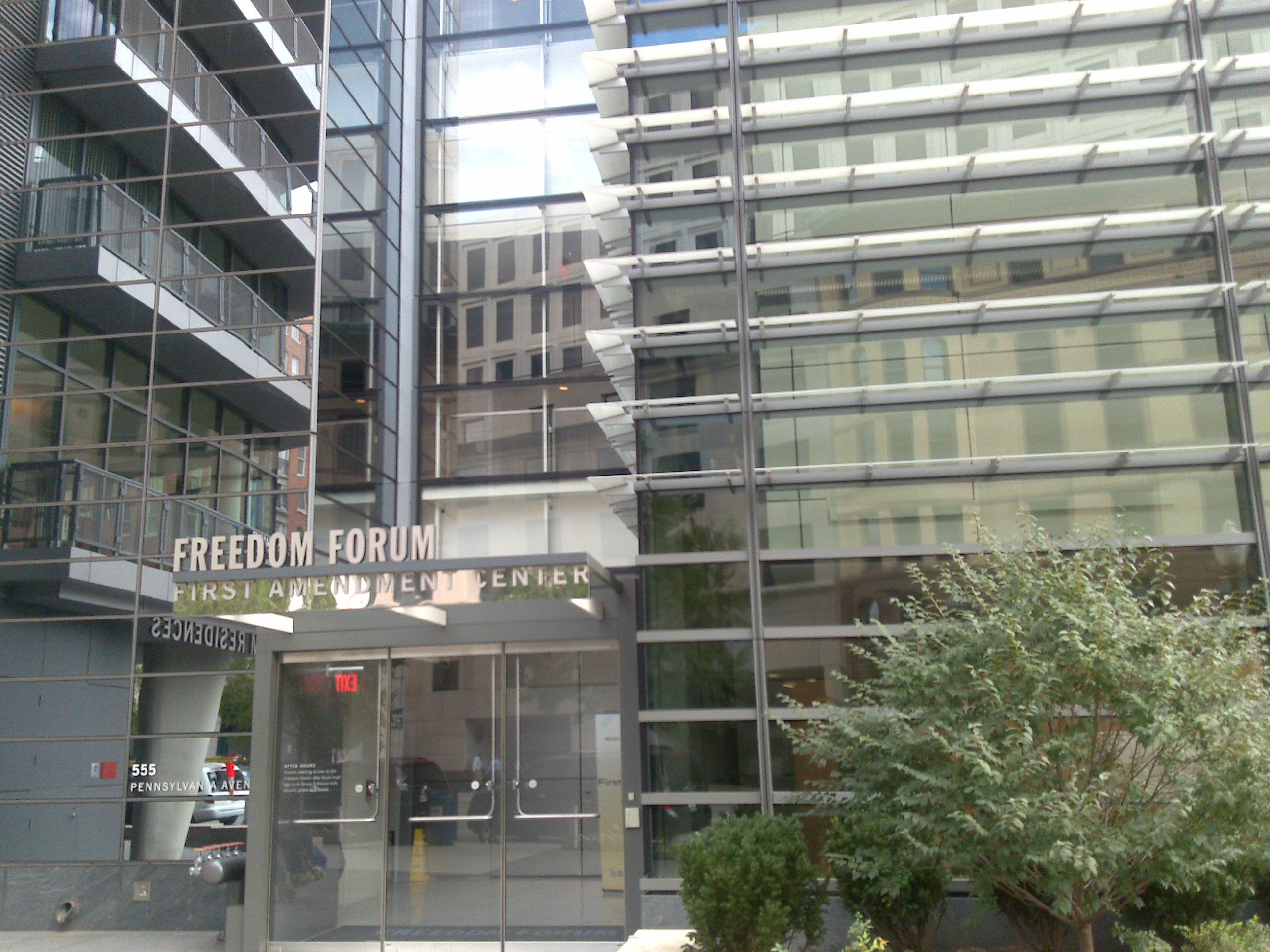 |
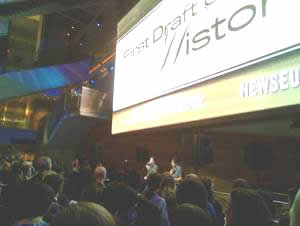 |
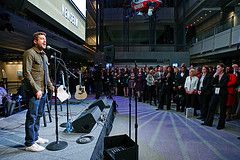 |
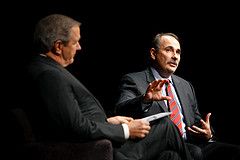 |
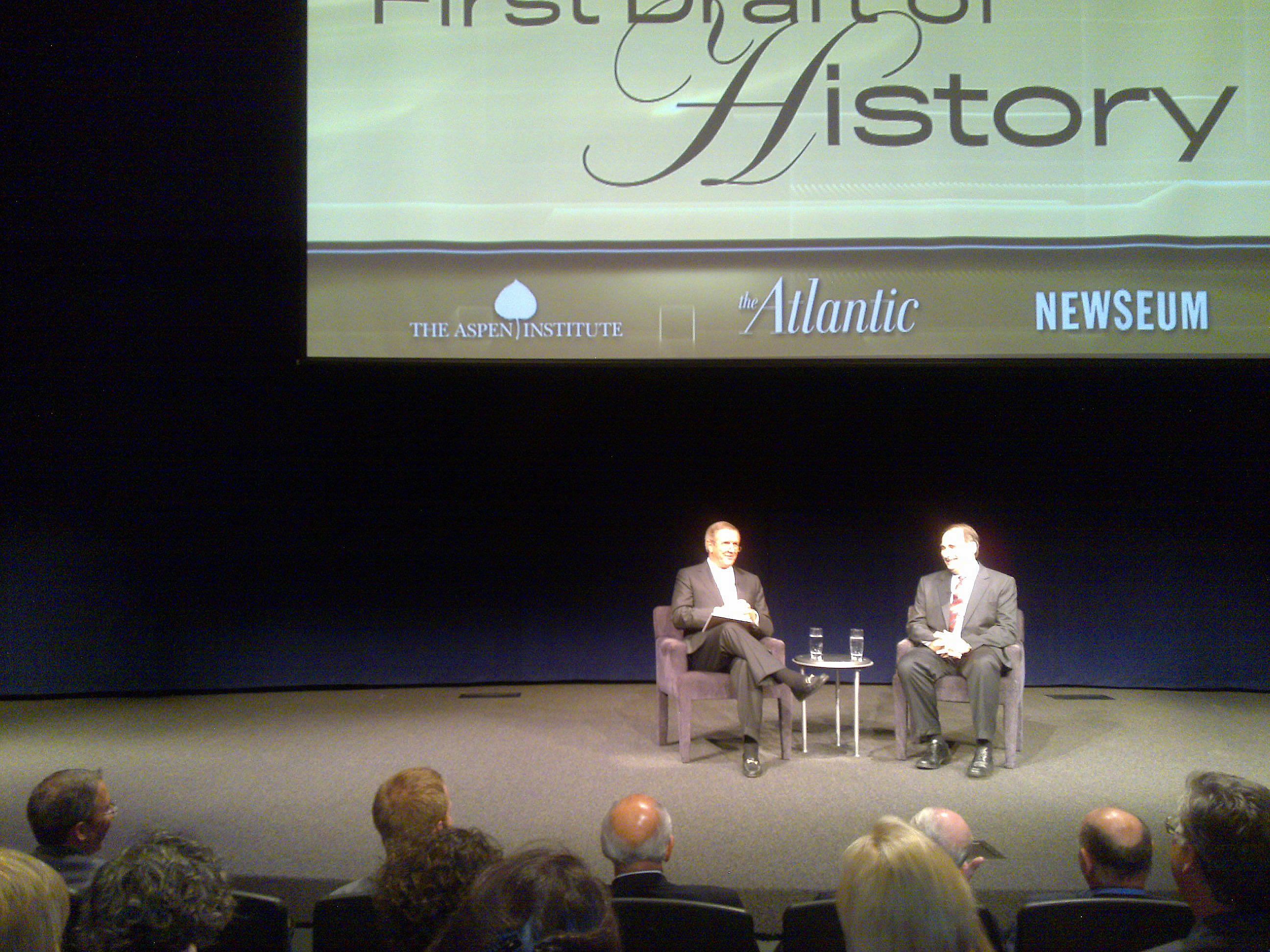 |
| CBSNEWS:
'National Economic Council Director Lawrence Summers said Friday that despite bad news on the unemployment front, the worst of the economic downturn "is passed," arguing that "we're going to see a basic pattern of recovery." |
Summers, following the lead of Vice President Joe Biden, praised the effects of the economic stimulus package, saying it kept policemen and teachers from losing their jobs. He said there was still progress to be made in areas such as digitizing medical records, stating that the average hospital has worse information technology capabilities than the average supermarket.
Summers declined to directly address questions about a second stimulus package, saying he doesn't know exactly what the phrase means. He said "we certainly need to continue to support people who are in need," and stressed the importance of "continuing public investments." |
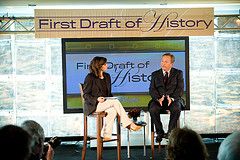
|
Asked about the budget deficit, he said it's an important issue but suggested that it isn't a reason to refrain from public investment. "We're not going to have a healthy budget in a profoundly unhealthy economy," he said. 02 Oct 2009 03:03 pm: Historian Adam Green on the Obama Era ends the First Draft of History meeting. " Far from having soothed the rancor of the country". |